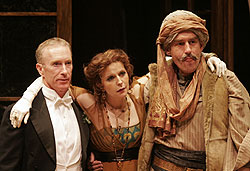Heartbreak House: It is and it isn’t. George Bernard Shaw’s brilliant play about a handful of oddly interconnected characters gathered on the eve of World War I captures the kind of anomie and social charade we seem to play in the face of the coming global holocaust. It takes a heart to break, and it’s never clear in Intiman’s fine, faithful production who among the characters are awake enough to reality and to themselves to understand the extreme peril they’re in—their blithely self-created dangers as well as the obliterating shrapnel of the bombs that begin dropping with so much misguided hoopla in the final act. In the end, for all Shaw’s acute social content, this is a deeply existential play, a bitterly funny meditation on the sadly charming masks donned by a class of people on the verge of extinction. And for some of the people, that pogrom might as well be a masked ball, full of fireworks and champagne. What fun.
Heartbreak House is the domain—or zoo, or cage—of the aging patriarch Capt. Shotover (the excellent Michael Winters), a muttering, straight-shooting patriarch whose disillusion runs so deep he simply occupies himself with ridiculous means of exterminating humanity by various crackpot inventions. Around this sentimentalist in misanthropic garb revolves a family of gaming, oversexed, too-witty daughters, sons-in-law, and hangers-on who never quite understand the magnetic push and pull of the Captain’s home. More than once, a character will claim: There’s something strange here. There’s something wrong with this house.
It is the guest Ellie Dunn (Alexandra Tavares), affianced to the elderly maybe-tycoon Alfred Mangan (Laurence Ballard, sometimes also referred to, with hilarious cruelty, as “the Object”), who finally gives the house its rightful name. Tavares, in a wonderfully mannered performance, provides the real “heart” of the play, though indeed she’s surrounded by a top-notch cast full of fantastic performances. It is Dunn, the first person to walk into an apparently empty house, who becomes the ultimate catalyst that changes, to varying degrees, the lives of everyone she touches. Her personal struggle—whether to marry for money to avoid a life of poverty, or to save her soul through love (not necessarily mutually exclusive domains in her mind)—launches a chaos of partner swapping, unearthed jealousies, revealed resentments, and, most importantly, a breakout of weltschmerz and spiritual paralysis that afflicts everyone.
Surrounding Dunn are the Captain’s two daughters, Mrs. Hesione Hushabye (Kate Goehring), a charming siren trying to break off Dunn’s engagement to “the Object,” and the haughty and embittered Lady Ariadne Utterword (Suzanne Bouchard), married, according to the Captain, to a blockhead of a government official. Add to them the swashbuckling prevaricator Hector Hushabye (Stephen Pelinski), whose seductions ultimately “break” Dunn’s heart, as well as Dunn’s meekish father, Mazzini Dunn (David Pichette), and Ariadne’s brother-in-law, Randall Utterword (R. Hamilton Wright), and the circus is complete. In Shaw’s vision, this mess of a population represents England in microcosm, a society in denial of the impending apocalypse that will render all their games and fancy ideas moot, and worse.
Director Jon Jory plays it faithful and to the bone, allowing the wonderful flow of Shaw’s language to compel the action, making this complicated, tortuous story simple to follow. The sets are a lovely evocation of the disrepair and disorder of a bohemian lifestyle gone a little too apeshit, until the third act, when everything opens up into a sparse representation of a night outdoors. The stage, sprinkled with lawn chairs and tables, almost looks like a cruise ship at sea—not a bad metaphor, if one considers the fate of the Titanic. And the cast is uniformly excellent: Tavares, an alumni of Washington Ensemble Theatre, plays her part with a brand of tough-minded restraint that now and then hints at a telling vulnerability. Winters is perfect as the Captain, and Goehring and Pelinski shine as a couple suffering through the loosest kind of imperiled love. Heartbreak House, for all its British manners and references to an early 20th-century conflict, is the right play at the right time. It’s what we need now—to see, to hear, and to listen to.








